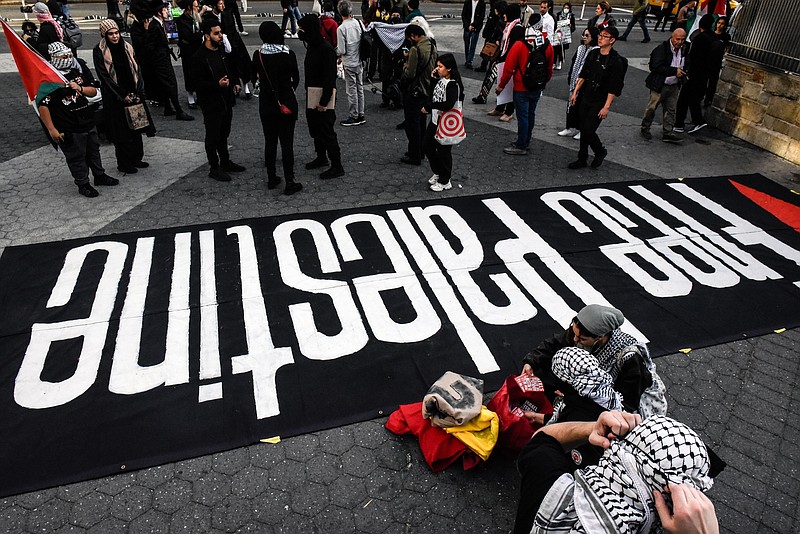Last week, Susanne DeWitt, an 89-year-old Holocaust survivor who later became a molecular biologist, spoke before the Berkeley, California, City Council to request a Holocaust Remembrance Day proclamation. After taking note of a "horrendous surge in antisemitism," she was then heckled and shouted down by protesters at the meeting when she mentioned the massacre and rapes in Israel of Oct. 7.
At the same meeting, a woman testified that her 7-year-old Jewish son heard "a group of kids at his school say, 'Jews are stupid.'" She, too, was heckled: "Zionists are stupider," a protester said. At the same meeting, others yelled, "cowards, go chase the money, you money suckers" and "you are traitors to this country, you are spies for Israel."
Protest movements have an honorable place in American history. But not all of them. Not the neo-Nazis who marched in Chicago in 1978. Not the white supremacists who chanted "Jews will not replace us" at their Unite the Right rally in Charlottesville, Virginia, in 2017.
And not too much of what passes for a pro-Palestinian movement but is really pro-Hamas, with its calls to get rid of the Jewish state in its entirety ("from the river to the sea ..."), its open celebration of the murder of its people ("resistance is justified ...") and its efforts to mock, minimize or deny the suffering of Israelis, which so quickly descend into the antisemitism on naked display in Berkeley.
How did this happen?
It wasn't a response to the human suffering in the Gaza Strip in recent months. A coalition of Harvard student groups issued a statement on Oct. 7 holding "the Israeli regime entirely responsible for all unfolding violence." Pro-Hamas demonstrations broke out worldwide on Oct. 8. A Black Lives Matter chapter posted a graphic on Instagram of the Hamas paragliders who murdered hundreds of young Israelis at the Nova music festival. A Cornell professor said he found the massacre "exhilarating," and demonstrators rallied in his support.
Nor is it a matter of seeking a Palestinian state — another fact the demonstrators openly avow. Among the popular chants at many protests is "We don't want no two states! We want all of '48!" — all of what had been Mandatory Palestine before the creation of Israel. Israeli soldiers and settlers vacated Gaza almost 20 years ago. The towns and kibbutzim that Hamas invaded on Oct. 7 are only "occupied" if one believes that all of Israel, in any kind of border, is a form of occupation.
In other words, the central, animating sentiment behind much of the protest movement is neither humanitarian nor liberationist. It's eliminationist. And it expresses itself routinely in the tactics adopted by so many of its leading activists and followers.
Tactics like the grotesque and routine removal or defacement of posters of Israelis kidnapped to Gaza. Or holding a loud and aggressive demonstration outside New York's Memorial Sloan Kettering cancer hospital ("Make sure they hear you, they're in the windows," said one of the protest leaders), apparently because the hospital has collaborated with Israeli medical institutions. Or forcing a Jewish teacher at a public school in Queens to flee her classroom for safety as hundreds of teenagers rioted through the school, some waving Palestinian flags. Or shouting down Rep. Jamie Raskin at the University of Maryland for being "complicit in genocide" when he came to the campus to give a talk on democracy and "the threat to reason in the 21st century." Or surrounding a theater at the University of California at Berkeley that was supposed to host a talk by an Israeli lawyer, smashing windows, breaking through locked doors, spitting on and grabbing at least one student by the neck and forcing Jewish students to flee through an underground exit.
This is only a partial list. But it reveals the bullying mentality at the heart of the pro-Hamas movement. It isn't enough for them to speak out; they must shut other voices down. It isn't enough for them to make a strong or clear argument; they also aim to instill a palpable sense of fear in their opponents. American civil libertarians of the past once understood that inherent in the right to protest was the obligation to respect the right of people with differing views to protest as well. That understanding seems to be wholly absent from the people who think that, say, heckling Raskin into silence is also a form of democracy.
In this sense, critics of Israel who claim that American Jews must choose between Zionism and liberalism have it backward. The illiberals aren't the people defending the right of an imperfect but embattled democracy to defend its territory and save its hostages. They are the people who, like former Iranian president Mahmoud Ahmadinejad, want Israel wiped off the map and aren't ashamed to say so. Not surprisingly, they also seem to share Ahmadinejad's attitudes toward dealing with dissent.
It's true that in nearly every political cause, including the most justified, there are ugly elements — the Meir Kahanes or the Louis Farrakhans of the world. But the mark of a morally serious movement lies in its determination to weed out its worst members and stamp out its worst ideas. What we've too often seen from the "Free Palestine" crowd is precisely the opposite.
